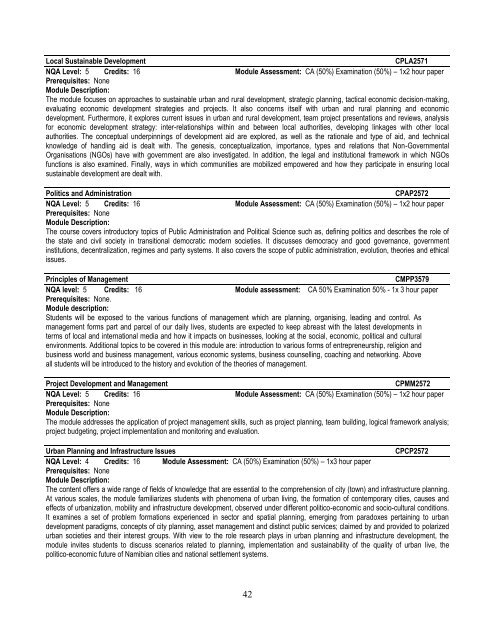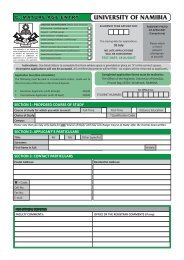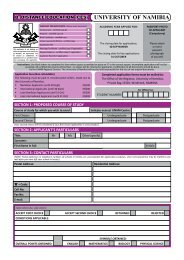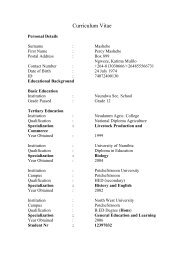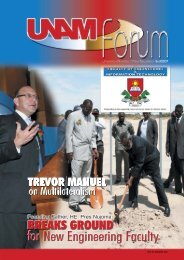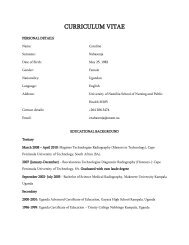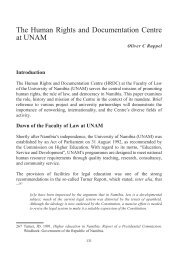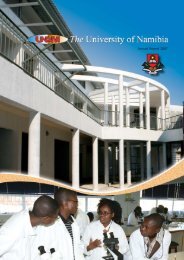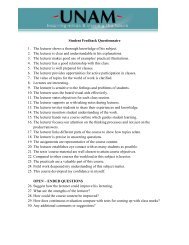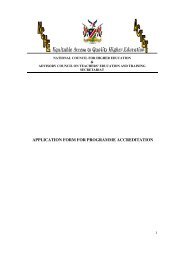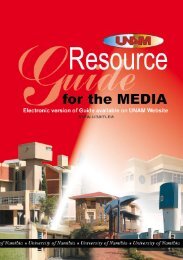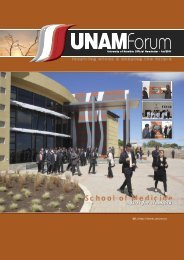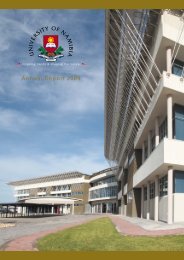UNIVERSITY OF NAMIBIA CENTRE FOR EXTERNAL STUDIES ...
UNIVERSITY OF NAMIBIA CENTRE FOR EXTERNAL STUDIES ...
UNIVERSITY OF NAMIBIA CENTRE FOR EXTERNAL STUDIES ...
You also want an ePaper? Increase the reach of your titles
YUMPU automatically turns print PDFs into web optimized ePapers that Google loves.
Local Sustainable DevelopmentCPLA2571NQA Level: 5 Credits: 16 Module Assessment: CA (50%) Examination (50%) – 1x2 hour paperPrerequisites: NoneModule Description:The module focuses on approaches to sustainable urban and rural development, strategic planning, tactical economic decision-making,evaluating economic development strategies and projects. It also concerns itself with urban and rural planning and economicdevelopment. Furthermore, it explores current issues in urban and rural development, team project presentations and reviews, analysisfor economic development strategy: inter-relationships within and between local authorities, developing linkages with other localauthorities. The conceptual underpinnings of development aid are explored, as well as the rationale and type of aid, and technicalknowledge of handling aid is dealt with. The genesis, conceptualization, importance, types and relations that Non-GovernmentalOrganisations (NGOs) have with government are also investigated. In addition, the legal and institutional framework in which NGOsfunctions is also examined. Finally, ways in which communities are mobilized empowered and how they participate in ensuring localsustainable development are dealt with.Politics and AdministrationCPAP2572NQA Level: 5 Credits: 16 Module Assessment: CA (50%) Examination (50%) – 1x2 hour paperPrerequisites: NoneModule Description:The course covers introductory topics of Public Administration and Political Science such as, defining politics and describes the role ofthe state and civil society in transitional democratic modern societies. It discusses democracy and good governance, governmentinstitutions, decentralization, regimes and party systems. It also covers the scope of public administration, evolution, theories and ethicalissues.Principles of ManagementCMPP3579NQA level: 5 Credits: 16 Module assessment: CA 50% Examination 50% - 1x 3 hour paperPrerequisites: None.Module description:Students will be exposed to the various functions of management which are planning, organising, leading and control. Asmanagement forms part and parcel of our daily lives, students are expected to keep abreast with the latest developments interms of local and international media and how it impacts on businesses, looking at the social, economic, political and culturalenvironments. Additional topics to be covered in this module are: introduction to various forms of entrepreneurship, religion andbusiness world and business management, various economic systems, business counselling, coaching and networking. Aboveall students will be introduced to the history and evolution of the theories of management.Project Development and ManagementCPMM2572NQA Level: 5 Credits: 16 Module Assessment: CA (50%) Examination (50%) – 1x2 hour paperPrerequisites: NoneModule Description:The module addresses the application of project management skills, such as project planning, team building, logical framework analysis;project budgeting, project implementation and monitoring and evaluation.Urban Planning and Infrastructure IssuesCPCP2572NQA Level: 4 Credits: 16 Module Assessment: CA (50%) Examination (50%) – 1x3 hour paperPrerequisites: NoneModule Description:The content offers a wide range of fields of knowledge that are essential to the comprehension of city (town) and infrastructure planning.At various scales, the module familiarizes students with phenomena of urban living, the formation of contemporary cities, causes andeffects of urbanization, mobility and infrastructure development, observed under different politico-economic and socio-cultural conditions.It examines a set of problem formations experienced in sector and spatial planning, emerging from paradoxes pertaining to urbandevelopment paradigms, concepts of city planning, asset management and distinct public services; claimed by and provided to polarizedurban societies and their interest groups. With view to the role research plays in urban planning and infrastructure development, themodule invites students to discuss scenarios related to planning, implementation and sustainability of the quality of urban live, thepolitico-economic future of Namibian cities and national settlement systems.42


